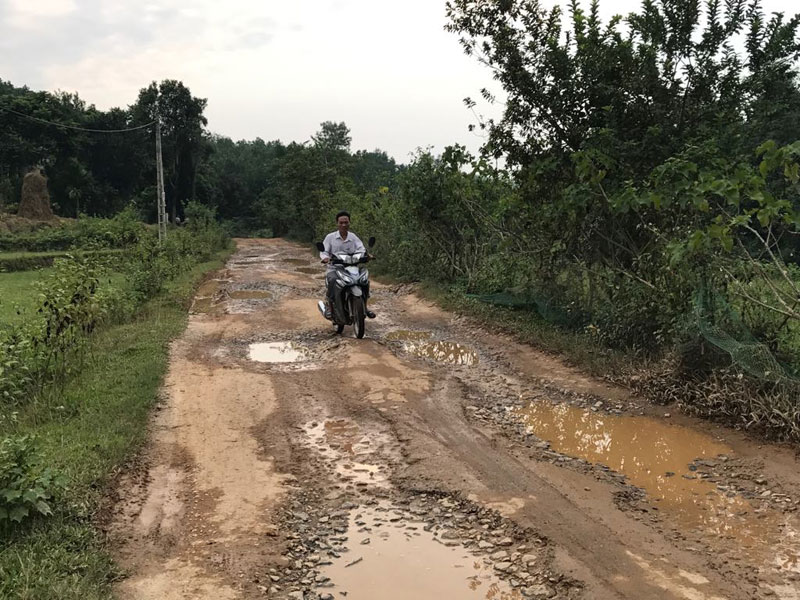
(HBO) – After six years implementing the national target programme on new-style rural area building, Dong Mon commune of Lac Thuy district has met only 10 out of 19 criteria.

The road connecting Dong Mon commune and Lac Hung commune in Yen Thuy
district remains rough.
As a remote area locating about 19km from
the district’s centre, Dong Mon commune has three villages with 358 households
and 1,048 people. The commune’s terrain is mostly low hills; the local
population live mainly on forestry, with 1,500 hectares of acacia trees
(including 72 ha newly planted this year). Although the tree areas bring
long-term and stable income, it is difficult for locals to make breakthrough in
economic development to raise incomes.
Over the past years, communal authorities
have encouraged locals to diversify crops in the direction of optimizing
natural and soil conditions of the locality to produce agricultural products
with higher economic values.
Currently, the commune is facing
difficulties in fulfilling the criterion on rural transportation. So far, only
27.55 percent of main roads in villages and hamlets have been concreted, while
all roads across fields are still dirt roads. Many roads in the commune are
still rough with holes, affecting trading activities, such as roads in Cu, Von
and Dung villages, the road to Lien Hoa and Lac Hung commune of Yen Thuy
district.
The criterion on irrigation has also not
been completed yet because the work requires large investment, long-term plans
with the cooperation between the government and the community. Over the past
years, the commune authorities have focused on upgrading the canal and
irrigation system to serve agricultural production.
Since early 2018, making full use of support
resources, the commune has repaired village-to-village roads as well as roads
inside villages, while clearing bushes along the roads and cleaning up the
environment.
Under the movement of solidarity in
building new-style rural areas, the local community contributed many working
days to repair 20km of roads, clear 13,000 square metres of land along roads,
and dredge open sewers.
Many role models have emerged during the
implementation of the movement, including Mr. Nguyen Duc Thai and Mrs. Bui Thi
Thao, both from Dung village, and Mr. Bui Duc Lam from Cu village who donated
land, construction materials and working days to build roads and cultural
infrastructure system.
However, many criteria have remained
uncompleted. The commune’s health care station has been degraded, while local schools
lack learning equipment, the collection of garbage remains spontaneous, and
many locals still live in temporary and dilapidated houses./.
With just over a month left until the school summer break, students are eagerly anticipating a period of rest and fun after a year of academic pressure. To provide a healthy environment for the physical development, in addition to the classes that foster talents and enhance the academic knowledge, sports and physical activities continue to attract a large number of children and teenagers.
On April 17th, Hoa Binh Provincial Museum organized a program to promote and introduce the outstanding values of "Hoa Binh Culture” at the Boarding Secondary and High School for ethnic minority students in Mai Chau District.
The Hoa Binh College of Technical Technology, in collaboration with the Hoa Binh Technical and Economic College and the provincial Association of Literature and Arts, hosted a gathering on April 15 to celebrate Laos’ traditional Bunpimay (New Year) Festival 2025 and debut the new book "Nguoi Muong o ban Don” (Muong people in Don village).
In the millennia-long history of national construction and safeguarding, people of all ethnic groups in Hoa Binh have been united and closely bound together to overcome all difficulties and challenges, standing alongside the entire Vietnamese people throughout the history of building and defending the country.
Living green is a healthy, positive, and sustainable lifestyle that not only helps protect
the environment and quality of life but also conserves natural resources and ecosystems.
Among the many ways to embrace this lifestyle, reducing plastic consumption is one of the most impactful.
The women's unions at all levels in Kim Boi district have been making significant contributions to the movement of building cultural life in the local community.
The movement helps improve rural look and the spiritual and material lives of local residents.



